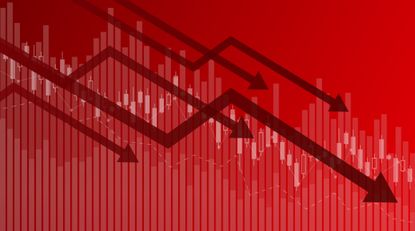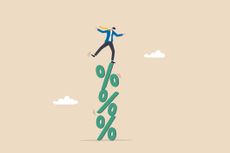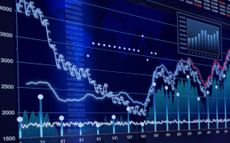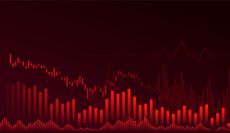Stock Market Today: Dow Sinks 430 Points as Jobs Data Boosts Bond Yields
The main indexes sold off sharply Tuesday as job openings climbed and Treasury yields soared.


Stocks took a nosedive Tuesday as shockingly strong jobs data sent Treasury yields spiking and raised expectations for another possible rate hike from the Federal Reserve.
The main benchmarks opened modestly lower today, but mid-morning data showing an unexpected rise in the number of job openings sent them spiraling in afternoon trading. Specifically, the Bureau of Labor Statistics said earlier that August job openings climbed by 690,000 to 9.6 million – exceeding economists' forecasts for job openings to fall to 8.8 million.
The data is "intensifying fears about a tight labor market and a resilient economy – one that may require a prolonged period of higher interest rates to combat inflation," says José Torres, senior economist at Interactive Brokers. "Commentary from Federal Reserve Presidents [Raphael] Bostic and [Loretta] Mester and other policymakers failed to inspire confidence, with members of the central bank beating their drums to the higher-for-longer rhythm."

Sign up for Kiplinger’s Free E-Newsletters
Profit and prosper with the best of expert advice on investing, taxes, retirement, personal finance and more - straight to your e-mail.
Profit and prosper with the best of expert advice - straight to your e-mail.
Rate-hike expectations, Treasury yields rise after jobs data
What's more, today's signs of a stubbornly tight labor market lifted expectations the Fed will raise rates again at its November meeting. According to CME Group, futures traders are now pricing in a 31% chance for a quarter-point rate hike, up from 16% one week ago.
The jobs data also kept the party alive for red-hot Treasury yields too. The yield on 2-year government bonds hit a 17-year high of 5.154% in intraday trading, while the yield on the 10-year note topped out at 4.81% – its highest level since mid-2007.
As for the major indexes, the rate-sensitive Nasdaq Composite closed down 1.9% at 13,059, while the S&P 500 was off 1.4% at 4,229. The Dow Jones Industrial Average fell 1.3% to 33,002, erasing its year-to-date gain.
Today's selling was broad-based, with 10 of the 11 S&P 500 sectors to finish lower. Consumer discretionary stocks (-2.4%) fared the worst as travel-related issues such as Airbnb (ABNB, -6.5%) and Carnival (CCL, -6.6%) tumbled. Utility stocks, on the other hand, outperformed with a 1.2% gain.
Why the chances for a Q4 rally this year are "tricky"
We're only two days into October and the main indexes have already suffered notable declines. With this rough start, what are the prospects for a fourth-quarter rally? This is a question Jeffrey Buchbinder, chief equity strategist, Lawrence Gillum, chief fixed income strategist, and Adam Turnquist, chief technical strategist for LPL Financial, recently tackled.
While the fourth quarter has historically been a strong one for stocks, it could be "tricky" to expect an end-of-year rally considering "the overhang of a government shutdown, interest rates near 16-year highs [and] a market still trying to digest the Federal Reserve's 'higher for longer' message," the group writes. Additionally, headwinds facing consumers that include a drawdown in excess savings, student loan repayments and higher borrowing costs could weigh on markets.
Looking back at data since 1950 shows that stocks typically bottom in October before rallying into November and December – historically, the two strongest months of the year for the S&P 500 – the team from LPL Financial say. Still, they believe that any potential rebound this year will depend on interest rates.
"It may be difficult for corporate America to come up with enough good things to say to drive stocks higher given the economy is starting to lose some momentum and the dollar is so strong," the group writes. They add that while the government shutdown has been averted for now, the mid-November deadline isn't that far off and could keep pressure on the bond market in the near term.
Related content

With over a decade of experience writing about the stock market, Karee Venema is an investing editor and options expert at Kiplinger.com. She joined the publication in April 2021 after 10 years of working as an investing writer and columnist at Schaeffer's Investment Research. In her previous role, Karee focused primarily on options trading, as well as technical, fundamental and sentiment analysis.
-
-
 The Era of Super-Low Interest Rates Could Be Over: The Kiplinger Letter
The Era of Super-Low Interest Rates Could Be Over: The Kiplinger LetterThe Kiplinger Letter We’re likely never going back to the historically low rates that prevailed in late 2019 and early 2020.
By David Payne Published
-
 The Simple Yet Devastatingly Effective Secret To Warren Buffett and Oprah's Success
The Simple Yet Devastatingly Effective Secret To Warren Buffett and Oprah's SuccessA look at the common lesson to learn from the success of Warren Buffett and Oprah Winfrey.
By Eric McLoyd Published
-
 Stock Market Today: Dow Soars 511 Points After McDonald's Earnings
Stock Market Today: Dow Soars 511 Points After McDonald's EarningsAll three indexes notched impressive gains Monday ahead of a jam-packed week on Wall Street.
By Karee Venema Published
-
 If You'd Put $1,000 Into Disney Stock 20 Years Ago, Here's What You'd Have Today
If You'd Put $1,000 Into Disney Stock 20 Years Ago, Here's What You'd Have TodayDisney Disney stock, a long-time market laggard, has shed more than $220 billion in value since its all-time high.
By Dan Burrows Published
-
 Stock Market Today: S&P 500 Joins Nasdaq in Correction Territory
Stock Market Today: S&P 500 Joins Nasdaq in Correction TerritoryThe Nasdaq managed to hold higher into the close thanks to a strong earnings reaction for mega-cap stock Amazon.
By Karee Venema Published
-
 Stock Market Today: Stocks Fall Again After Sizzling GDP Report, Meta Earnings
Stock Market Today: Stocks Fall Again After Sizzling GDP Report, Meta EarningsThe first look at third-quarter GDP came in higher than expected, with consumer spending helping to prop up the economy.
By Karee Venema Published
-
 Stock Market Today: Nasdaq Enters Correction Territory After Alphabet Earnings
Stock Market Today: Nasdaq Enters Correction Territory After Alphabet EarningsSolid results from Microsoft weren't enough to offset substantial post-earnings losses from fellow mega-cap stock Alphabet.
By Karee Venema Published
-
 Stock Market Today: Earnings Boost Stocks, Bitcoin Price Hits New High
Stock Market Today: Earnings Boost Stocks, Bitcoin Price Hits New HighBitcoin rallied to its highest level since May 2022 amid signs that a spot bitcoin ETF could hit the market sooner rather than later.
By Karee Venema Published
-
 Stock Market Today: Stocks Finish Mixed as Treasury Yields Stabilize
Stock Market Today: Stocks Finish Mixed as Treasury Yields StabilizeStocks started the day in the red as the 10-year Treasury yield topped 5%, but finished well off their session lows.
By Karee Venema Published
-
 Stock Market Today: Stocks Sink With Big Tech Earnings on Deck
Stock Market Today: Stocks Sink With Big Tech Earnings on DeckAmerican Express and Regions Financial were two post-earnings losers Friday, while SolarEdge slumped on its Q3 warning.
By Karee Venema Published









